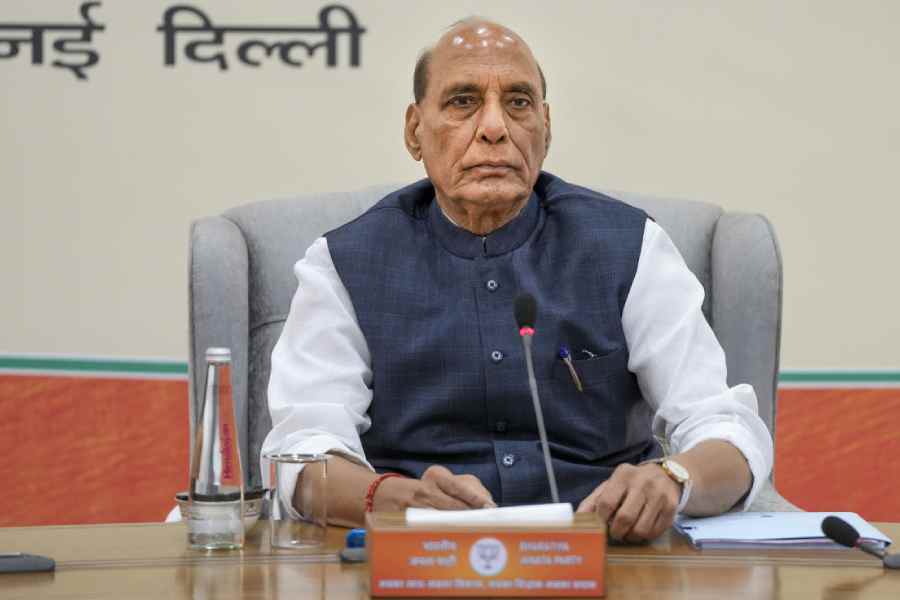Slim pickings
Sir — Cat owners are always at their wits’ end trying to cater to their finicky pets. But if they think cats are picky eaters, what would they say about the Gigantopithecus, a species of apes, that went extinct because its favourite fruits were unavailable? New research shows that the Gigantopithecus, the largest apes to be discovered to date, lived to be nearly 10 feet tall and were herbivores. But when climate disruptions resulted in a scarcity of its favoured fruits, the Gigantopithecus chose to starve to death rather than adapt by climbing trees to obtain other fruits. With extreme weather events on the rise owing to climate change, picky eaters across species need to get used to diets that are not just easily available but also environmentally sustainable.
Sneha Roy, Calcutta
Strained ties
Sir — The decision of the Maldives to set a deadline for India to withdraw its military troops has serious implications for the ties between the two countries (“Maldives wants India troops out by March 15”, Jan 15). The Indian troops in question constitute only crews and technicians for Indian patrol vessels that serve humanitarian rather than military purposes. The Maldives, like several other small nations, will suffer the consequences of befriending China, which has a history of aggressively dominating the political spheres of its allies. Moreover, the Indian government deserves a formal apology from the Maldives for the derogatory posts by Maldivian ministers against the Indian prime minister.
However, the fracas with the Maldives is a good opportunity for our tourism ministry to improve the infrastructure at Indian beaches, making them viable alternatives to Maldivian destinations. It would also be a fitting response to the Mohamed Muizzu-led administration’s anti-India stance.
Avinash Godboley, Dewas, Madhya Pradesh
Sir — From signing the Treaty of Friendship in 1981 to witnessing excellent bilateral relationships during Mohamed Nasheed’s presidency to the anti-India sentiments of the present day, the relationship between New Delhi and Male seems to have taken an about-turn.
The Maldives now aims to strengthen its ties with China, which is building a strategic network of allies in the Indian Ocean region. India has been a true ally to the Maldives; it should not jeopardise this friendship for China.
Bal Govind, Noida
Sir — The Maldives has set a deadline for Indian troops to vacate the country. This marks a new low in the ties between the two countries. Unfortunately for India, the Maldives seems more interested in securing a friendship with China whose clout is growing in the Indian Ocean region. India must take steps to address its ties with its island neighbours to resolve this geopolitical impasse.
Kirti Wadhawan, Kanpur
Sir — The Mohamed Muizzu-led government in Male has set March 15 as the deadline for India to withdraw its military personnel from the Maldives. Muizzu’s trip to China seems to have added fuel to the tension already fomenting between Male and New Delhi. India has previously extended tremendous support to the Maldives and the current standoff could hit the island country hard. Muizzu should keep in mind the security of his nation and rectify his stance.
Mohammad Taukir, Bettiah, Bihar
Unique display
Sir — Unesco has decided to launch a virtual museum that will feature stolen artefacts from all over the world. Several artefacts, including a figurine of Varaha taken from a temple complex in Rajasthan and an ivory relief of a lion attacking a Nubian stolen from Baghdad, will be displayed as three-dimensional images. According to Interpol, roughly 52,000 cultural objects have been stolen from museums, archaeological sites and collections. Such thefts deprive society of knowledge about cultural heritage. Countries should implement stricter prohibitions on the illegal import and export of cultural property.
Arka Goswami, Durgapur
Free lunches
Sir — Women agriculturalists in Odisha are worried about the worsening condition of agriculture in the state owing to irresponsible government measures (“Opposition to free rice plan in Odisha”, Jan 15). The government’s free rice scheme has reduced farmers’s profits and also led to a shortage of labourers. The scheme has made people lazy, the women farmers claim, and youths are moving out of the state to pursue other jobs. In the long term, this can destroy Odisha’s agricultural prospects. The free rice scheme must be moderated and the minimum support price increased to bring people back to agriculture.
Shyamal Thakur, East Burdwan
Cluttered space
Sir — Space pollution is a pressing concern. Over 34,000 fragments larger than 10 cm are in orbit around the earth, alongside millions of pieces of smaller debris. Such pollution is caused by various human activities such as rocket launches, satellite operations and intentional destructions of satellites. China’s 2007 satellite destruction event, for instance, created over 3,000 pieces of space debris. This not only has an environmental impact but can also jeopardise space exploration and cause potential damage to essential services like communication, navigation and weather forecasting.
Existing regulations under the Outer Space Treaty of 1967 and guidelines from the Inter-Agency Space Debris Coordination Committee are not enough as these are not followed by all countries and are not legally enforceable. Efforts to combat space pollution include improvements in spacecraft design, reusable rockets and technology for the capture and disposal of space debris. Tackling this complex issue requires heightened awareness, responsibility and coordinated action from all stakeholders.
Amarjeet Kumar, Hazaribagh










